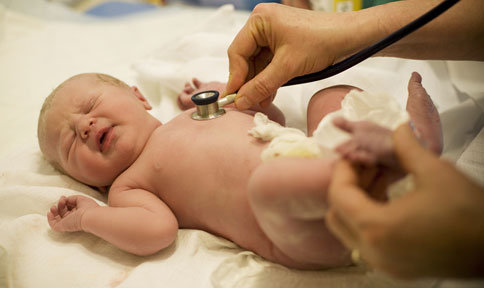Birth Injury Lawsuit Settles for $4 Million
2018 Medical Malpractice Trial Report
Mismanagement of labor and delivery results in severe and permanent neurological damage in newborn. Diagnosed with cerebral palsy, child relies on caregivers for all aspects of daily living.
Plaintiff was expecting her first child in July 2012. An induction was planned for 7/25/12. All fetal testing was reassuring to this point.
On the morning of induction plaintiff had clear rupture of membranes and she presented to the hospital. At 7:32 a.m., she was on the fetal monitor and Pitocin was begun at 8:00 a.m. Throughout the morning and early afternoon, nursing increased the Pitocin pursuant to protocol without change on the fetal monitor. At 1:45 p.m. nursing noted a decrease in variability and applied oxygen and position changes for the mother. Pitocin was decreased and then stopped. The defendant obstetrician was notified and came to evaluate at 2:30 p.m. The defendant found no problems and ordered Pitocin restarted.
 Learn more about:
Learn more about:
Boston's Birth Injury Law Firm
Read
about other significant birth injury verdicts and settlements and how our medical malpractice lawyers may be able to help you.
Also see our Patient Safety Blog posts:
Mother's Dying in Childbirth — A Preventable Tragedy
$35.4 Million Verdict in Mother’s Childbirth Stroke Case Upheld on Appeal
Between 3:00 - 6:30 p.m. plaintiff was being monitored by the defendant providers. No changes were noted on the monitor with the exception of a baseline that had risen from 125 bpm at admission to 150 bpm around 6:30 p.m. Beginning at 6:30 p.m. plaintiff’s expert was prepared to testify that the fetal monitor strip showed worrisome changes - decelerations, decreased variability and fetal tachycardia with heart rates in the 170’s. This indicates hypoxia and required emergency delivery no later than 9:15 p.m. The defendants were noted to be in the room during this period of time increasing the Pitocin and performing vaginal examinations but no problems were noted until 9:30 when they noted tachycardia.
Delivery occurred at 10:05 p.m. with the defendants noting minimal variability and a baseline heartrate in the 190’s. There was thick meconium and Apgars of 2, 2, and 3. The baby was taken to the SCN and then transferred to an outside NICU. She was placed on the hypothermic protocol due to concerns for hypoxia. She was treated for seizures and brain imaging was consistent with global hypoxic ischemic injury. She was later diagnosed with cerebral palsy. She cannot walk or talk, her vision is impaired and she relies on caregivers for all aspects of daily living.
Plaintiff’s experts were prepared to testify that earlier delivery would have avoided this global injury which was due to intrapartum asphyxia. Defense experts were prepared to testify that the fetal monitor strips revealed a well oxygenated baby and the injuries had occurred prior to plaintiff’s presentation at the hospital. Trial was scheduled for May 2018 and the parties were able to reach a settlement prior to trial.
Lubin & Meyer represented the plaintiff in this lawsuit. (Andrew C. Meyer, Jr. and Krysia J. Syska, Court: Bristol Superior Court)
Questions about birth injuries?
Do you have questions about a possible medical malpractice lawsuit involving a birth injury sustained before, during or after delivery in MA, NH or RI?
Contact Us - There is no fee or cost to you to have your case evaluated by our qualified medical malpractice attorneys. Call 800-866-2889 to speak with an attorney today.
Lubin & Meyer PC - Boston’s Innovative Leader in Medical Malpractice and Personal Injury Law
Our medical malpractice lawyers are licensed to practice in: Massachusetts, New Hampshire and Rhode Island.
Return to: Verdicts & Settlements archive
Return to: Lubin & Meyer home page
